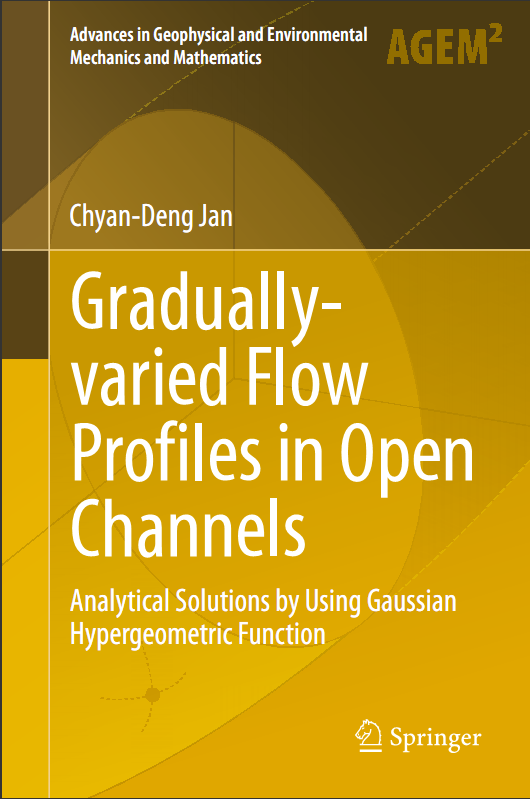Jan C. D., Gradually-varied Flow Profiles in Open Channels, 2014
Author: Chan-Dong Jan
Year of publication: 2014
Format: PDF
Number of pages: 196
Quality: OCR
Publication: Springer
Jan CD, Gradually-varied Flow Profiles in Open Channels, 2014

1.1 Introduction
The one-dimensional gradually-varied flow (GVF) is a steady non-uniform flow in a
prismatic channel with gradual changes in its water surface elevation. Many hydraulic
engineering works involve the computation of one-dimensional GVF surface profiles
such as the drawdown produced at a sudden drop in a channel and the backwater
produced by a dam or weir across a river, as indicated by Chaudhry (2006), Chow
(1959), Subramanya (2009), Jan and Chen (2012), Vatankhah (2012), among others.
The evaluation of steady one-dimensional gradually-varied flow profiles under a
specific flowdischarge is very important in open-channel hydraulic engineering. Two
basic assumptions are involved in the analysis of GVF. One is the pressure distribution
at any section assumed to be hydrostatic. The other is the resistance to flow at any
depth assumed to be given by the corresponding uniform flow equation, such as
Mannings equation. Almost all major hydraulic-engineering activites in free surface
flow involve the computation of GVF profiles. The various available procedures
for computing GVF profiles can be classified as: the graphical-integration method,
the direct integration, and the numerical method, as shown in Chow (1959) and
Subramanya (2009). The development of the basic GVF dynamic equation and the
classification of flow profiles in a prismatic channel is reviewed and discussed in this
chapter. The direct integration method for analytically solving the GVF equation by
using the Gaussian hypergeometric function (GHF) will be presented in subsequent
chapters.
3.06MB
Download
http://s9.alxa.net/s9/srvs3/01/006/G...nnels.2014.rar
The one-dimensional gradually-varied flow (GVF) is a steady non-uniform flow in a
prismatic channel with gradual changes in its water surface elevation. Many hydraulic
engineering works involve the computation of one-dimensional GVF surface profiles
such as the drawdown produced at a sudden drop in a channel and the backwater
produced by a dam or weir across a river, as indicated by Chaudhry (2006), Chow
(1959), Subramanya (2009), Jan and Chen (2012), Vatankhah (2012), among others.
The evaluation of steady one-dimensional gradually-varied flow profiles under a
specific flowdischarge is very important in open-channel hydraulic engineering. Two
basic assumptions are involved in the analysis of GVF. One is the pressure distribution
at any section assumed to be hydrostatic. The other is the resistance to flow at any
depth assumed to be given by the corresponding uniform flow equation, such as
Mannings equation. Almost all major hydraulic-engineering activites in free surface
flow involve the computation of GVF profiles. The various available procedures
for computing GVF profiles can be classified as: the graphical-integration method,
the direct integration, and the numerical method, as shown in Chow (1959) and
Subramanya (2009). The development of the basic GVF dynamic equation and the
classification of flow profiles in a prismatic channel is reviewed and discussed in this
chapter. The direct integration method for analytically solving the GVF equation by
using the Gaussian hypergeometric function (GHF) will be presented in subsequent
chapters.
3.06MB
Download
http://s9.alxa.net/s9/srvs3/01/006/G...nnels.2014.rar